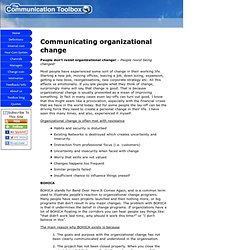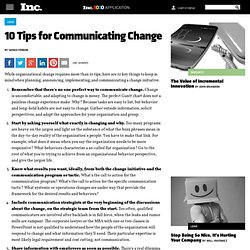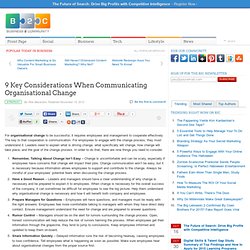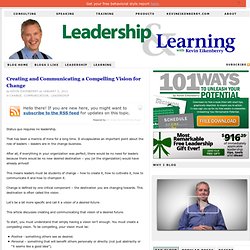

Organizational change. People don’t resist organizational change!

– People resist being changed! Most people have experienced some sort of change in their working life. Starting a new job, moving offices, leaving a job, down sizing, expansion, getting a new boss, reorganisations, new corporate strategy etc. All this affects us emotionally. Change Agent Tip #15: Let’s Face It: Change is Hard. Most Organizational Change Management (OCM) professionals know plenty of theory and have plenty of experience.

But why is it that even when we bring this wealth of OCM knowledge and talent to bear, change still seems so hard? Consider these four reasons why change is difficult: 1. 10 Tips for Communicating Change, Leadership and Delegation Article - Inc. Article. While organizational change requires more than 10 tips, here are 10 key things to keep in mind when planning, announcing, implementing, and communicating a change initiative: Remember that there's no one perfect way to communicate change.

The Change Is Good Movie. Change communication - let's not make it too complicated - Internal communications - it's not rocket science. I've been reading a lot about change recently. And I'm struck by how complicated people like to make it. Surely change communications is about getting a few things right. Over the years I have developed a template - which borrows heavily from Bill Quirke - that suggests that you just need to focus on five stages. Step one - Awareness Have you told people the simple stuff about change? I read somewhere that people have to be told things multiple times before it penetrates and one of the challenges facing an IC manager is in convincing senior leaders that they need to repeat stuff endlessly.
As a result it's tough for higher managers to appreciate exactly how ignorant everyone else is. Comms helps when it is repetitive; find several different ways of reporting proposals on the intranet, think about posters or anything you can just to announce that the circus is in town. Step two - understanding Step three - Belief Despite what some people think - understanding does not equate to commitment. Liam. Five Questions That Should Shape Any Change Program - Scott Keller and Colin Price.
By Scott Keller and Colin Price | 11:48 AM December 2, 2011 Most organizations will shrink or disappear in the long term: only a third of excellent companies remain excellent for decades, and when organizations try to transform themselves, even fewer succeed.

But as economic, political, social, and technological change continue to accelerate, and competitive pressure grows more intense, leaders can’t afford those odds. The likeliest way to overcome them, we found as we wrote Beyond Performance, is to address the underlying problem: organizations that focus too much on short-term financial performance, at the expense of organizational health, are those that most typically need transformational change; but, unfortunately, the change programs they create are similarly shortsighted. Change programs that succeed, we’ve seen, put an equal emphasis on both performance and health in answering five basic questions that should shape any change program. 1) Where do we want to go? 4. 5. Staff Communication Tools. 10 Tips for Communicating Change to Employees: Tip 1 - Prepare for Change Constant change has almost become a norm, so challenge the status quo regularly to help employees become aware of the need for change, either now or in the future.

Use staff quizzes to challenge the current situation. This is an example of a question you might include: “In our changing industry, which will be the most effective way to do business in the future? A, B or C?” To ensure high employee participation, use a quiz format that is delivered directly onto targeted employee’s computer screens with display recurrence options based on the user’s response. Tip 2 - Customize and Target Messages. Enterprise wide change – the how, what and why « The Blog of Marcia Xenitelis. Change management is such a widely thrown around term these days.

Everyone is a change manager, HR, Organisational development, Employee Communication, Operations Managers, Project Managers, IT managers…the list goes on. None of these roles in my view are change managers, what they do has an impact on changing something, whether it is roles, capabilities, productivity etc, but essentially the core skill is what their title implies. We all know that projects have “change managers” on them to help design and implement the changes that the project is focussed on. However the most significant contribution change managers can make to an organisation in my view is enterprise wide change. This is where there is a significant difference from change on projects as the focus is on helping the organisation manage the implementation of strategy across the organisation.
Essentially you are the conductor of the orchestra ensuring that there are no wrong notes played during the performance. 1. 2. 3. Amersham's Proactive Change Straregy. Change Management: Why You Must Address the Pink Elephant in the Room. 9 Key Considerations When Communicating Organisational Change. Popular Today in Business: All Popular Articles For organisational change to be successful, it requires employees and management to cooperate effectively.

The key to that cooperation is communication. 10 important ingredients for a successful change implementation - Blog/News - Bob Hayward. 22 August 2012 10 tips for a successful chance implementation What makes some succeed better with implementation of key messages in large organisations than others?

The answer lies in that these companies have a simple and clear message adapted to reality, they create activity and participation in the whole organisation, everyone gets the same message, they follow-up, they give feed-back and support and finally the management actively shows that they walk the talk. Tough Times Demand More Talk. Creating and Communicating a Compelling Vision for Change. Status quo requires no leadership.

That has been a mantra of mine for a long time. It encapsulates an important point about the role of leaders – leaders are in the change business. After all, if everything in your organization was perfect, there would be no need for leaders because there would be no new desired destination – you (or the organization) would have already arrived! 4 blunders when communicating change - Sales Machine. (MoneyWatch) So the time has come to communicate a major change at your organization.

Maybe it is a downsizing, a restructuring, or a switch to a "better" compensation system (ha, not bloody likely). Unfortunately, we've all seen how such announcements often unfold. Employees huddle in the cafeteria, where the CEO makes an impassioned speech worthy of a football coach (or not). Following the usual call to win one for the team, the company launches a communications campaign on several fronts.
Offices are bombarded with videos. But the game is already lost. 1. 2. 3. 4. While other forms of communication should not be abolished, the emphasis should be on making supervisors privileged receivers of information. . © 2012 CBS Interactive Inc..